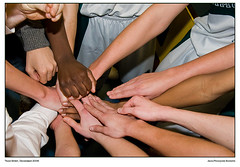 As with just about anything in our world, meaning and definition and understanding depend heavily on the context and situation. Take collaboration (again). I've written about it many times, and I think I have a decent understanding of the topic. Then someone like Nathan Zeldes comments that worrying about definitions is pointless, as ALL WORK requires people to work together - today's work cannot be done without collaborating. So the question shouldn't be so much about what to call it as about how to make it the most effective possible.
As with just about anything in our world, meaning and definition and understanding depend heavily on the context and situation. Take collaboration (again). I've written about it many times, and I think I have a decent understanding of the topic. Then someone like Nathan Zeldes comments that worrying about definitions is pointless, as ALL WORK requires people to work together - today's work cannot be done without collaborating. So the question shouldn't be so much about what to call it as about how to make it the most effective possible.
Then I come across Andrew Campbell's HBR blogs post from September 2011 that says, Collaboration Is Misunderstood and Overused:
Collaborators face a different challenge. They will have some shared goals, but they often also have competing goals. Also, the shared goal is usually only a small part of their responsibilities. Unlike a team, collaborators cannot rely on a leader to resolve differences. Unlike a customer-supplier relationship, collaborators cannot walk away from each other, when they disagree.
The gist of his comments have to do with the internal work within a company. In this post, he suggests that it is much more useful to have formal requirements of working together (in teams or in customer-supplier relationships). In other words, don't rely on altruistic collaboration so much as defined deliverables.
At some level, this makes sense. If you need to get things done, then throwing the request out into the organization and hoping people come together around that need may not be the most effective way to do that. But then relying official relationships to get things done is going to be problematic as well. How many times have we heard about people following the "letter of the law" when it comes to team or contract interactions, but the resulting work is sub-par or merely adequate.
I suggest that even in situations where "working together" is part of the job could use better collaboration - a shared desire to do whatever it takes to win. Is this even "collaboration," or is it something else?
It is the desire to do something that goes beyond the strict interpretation of a contract or team roles that makes collaboration tick. It's what makes executives excited about the idea of collaboration. This almost requires that we step outside the narrowly defined roles and boundaries of a contract. The heart of what I've conceived of as collaboration means that command-and-control has to cede power to the people in the network and trust that they can get things done together, if given the right guidance as to what is important for the organization.
As is common with HBR blogs, there is a rich conversation in the comments on Campbell's blog entry.
[Photo: "Team Spirit, December 2006" by JF Schmitz]